If you clench your teeth at night, you might blame many different problems. Perhaps you have stress at work or home. Maybe you have bad dreams. Maybe you suspect jaw problems. However, there is one crucial cause of nighttime teeth clenching, also called sleep bruxism, that needs investigating: sleep apnea. If you think you might have sleep bruxism, it’s time to talk to an Omaha sleep dentist about the condition.
What Is Sleep Bruxism?
Sleep bruxism is when you clench or grind your teeth at night. This happens unconsciously, similar to the way that some people clench their teeth when they’re angry or stressed, but might not realize it.
How Sleep Apnea and Sleep Bruxism Are Connected
Our jaw and teeth perform an essential role in supporting and bracing our airway. During the day, your teeth normally clamp together to anchor the throat when you swallow. At night, the jaw performs a similar function.
But when your jaw doesn’t seem to be doing its job and your airway collapses, your body responds by clamping the teeth together to stabilize the airway and keep it open for breathing.
Research has primarily confirmed this association. Some studies suggest that bruxism is more associated with mild to moderate sleep apnea than severe sleep apnea. However, not all studies support this conclusion.
Researchers have also confirmed that bruxism typically follows an apneic event. After your breathing stops, it’s typically less than 30 seconds before your teeth clench. This is probably your body trying to prevent a recurrence, but eventually your jaw relaxes and your apnea recurs.
The strong association means that most people with sleep bruxism should contact an Omaha sleep dentist today for an evaluation. Most people who suspect sleep apnea in Omaha can take a sleep test at home.
Other Potential Causes of Sleep Bruxism
However, sleep apnea is not the only cause of sleep bruxism. People also have sleep bruxism because of:
- Age
- Stress
- Medications
- Lifestyle factors
- Genetic predisposition
- Other disorders
Sleep bruxism is common among children and teens. However, most people outgrow the condition.
If adults experience sleep bruxism, it’s often linked to stress. Some personalities, such as highly competitive individuals, are more likely to get stress-related sleep bruxism.
Some medications can increase your risk of sleep bruxism. The medications most often linked to sleep bruxism are antidepressants.
Lifestyle factors like caffeine consumption, smoking, and alcohol can also lead to sleep bruxism.
Sleep bruxism tends to run in families. This might be due to genetic predisposition, or it might be more linked to upbringing and personality similarities.
Bruxism can also be linked to numerous health disorders—people with gastroesophageal reflux disorder (GERD), Parkinson’s disease, dementia, and epilepsy.
With all the potential health links between sleep bruxism and other conditions, it’s important to talk to a doctor or sleep dentist in Omaha.
How to Know You’re Clenching Your Teeth at Night
As with sleep apnea, sleep bruxism can be hard to detect. Here are some signs and symptoms of sleep bruxism to watch for:
- Sleep partner reports that you clench or grind your teeth
- Teeth that flatten or grow uneven over time
- Worn tooth enamel, exposing the dentin
- Tooth pain or sensitivity
- Tired or sore face, jaw, or neck muscles
- Locked jaw
- Morning headache
- Bite injury to cheek or tongue in the morning
If someone shares your bed, they might hear the clenching or grinding. Most likely, you will notice that you wake up with a sore jaw, a headache, or sore teeth.
If sleep bruxism persists, you might see damage to your teeth. You might notice your teeth are flattening or growing uneven if you clench teeth in sleep on one side more than the other. You might see your teeth are so worn that you expose tooth material that is a different color.
Sometimes, your bruxism might make it impossible to open or close your jaw in the morning. This might be muscle pain or spasms, but it might also be due to displacing the cushioning disc from your jaw joint. Don’t try to force a locked jaw. If you think muscle pain is the cause of your locked jaw, apply moist heat to your jaw muscles to try to relax them. If you still can’t close your jaw, seek help from an Omaha dentist or doctor.
Morning headache might be linked to sleep apnea directly or due to your sleep-apnea-related headache.
Bite injuries to your cheek or tongue are a good sign that you’re clenching and grinding. Few other causes will result in this type of injury during sleep.
Help for Sleep Apnea in Omaha
If you are looking for a sleep apnea treatment, we can help. Please call (402) 493-4175 for an appointment with an Omaha sleep dentist at the Advanced Dental Sleep Treatment Center. Our office is in northwest Omaha, in North Park.



